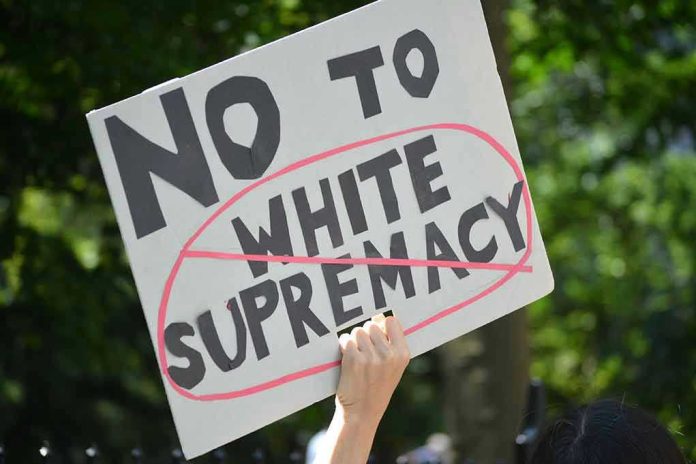
One man’s choice of costume outside a Georgia college bar didn’t just spark outrage—it triggered violence, arrests, and a campus reckoning about how much hate a community will tolerate before it strikes back.
Story Snapshot
- A man dressed in a Nazi uniform assaulted a student intervening against hate symbolism outside Cutter’s Pub in Athens, Georgia.
- The attack, captured on video, left the victim with a broken nose and the assailant facing aggravated assault charges.
- University, bar staff, and police responded swiftly, emphasizing zero tolerance for hate imagery and violence on campus.
- The incident has intensified debate over hate symbols in public, free speech, and the boundaries of intervention.
Hate Symbolism Ignites Violence Outside College Bar
Kenneth Morgan, age 33, stepped onto the sidewalk outside Cutter’s Pub in Athens, Georgia, wearing a Nazi officer’s uniform on a bustling Friday night. As Halloween approached, costumes were everywhere, but the swastika armband and SS insignia on Morgan’s attire jolted the crowd. Bar staff immediately denied him entry, but the real confrontation began outside—where University of Georgia students voiced disgust, and one student, Grace Lang, attempted to remove Morgan’s armband. That moment turned volatile as Morgan struck Lang across the face with a glass pitcher, shattering both the vessel and any semblance of social order. The incident, caught on video, would soon ricochet across social media, fueling outrage far beyond the college town.
Police arrived rapidly, arresting Morgan on charges of aggravated assault and simple battery. Lang, the student who intervened, suffered a broken nose and facial injuries. Cutter’s Pub condemned Morgan’s actions, while the University of Georgia rushed to support Lang and other students present, clarifying that Morgan had no affiliation with the school. The Athens-Clarke County Police reviewed video evidence, and Morgan’s arrest became a focal point for local and national media.
Why Nazi Symbols Still Shock—and Divide
Nazi uniforms and swastikas remain among the most powerful hate symbols in Western society. In the U.S., public display of such imagery is not illegal, protected under free speech, but it is overwhelmingly condemned—especially on college campuses. Athens, Georgia, home to the University of Georgia, is no stranger to heated debates on hate speech, but physical violence tied to such displays is rare. Recent years have seen increased sensitivity to hate symbolism, with universities nationwide facing student protests, calls for policy changes, and public reckonings in response to similar incidents. The Athens community found itself thrust into this conversation when a single night’s costume crossed the line from offensive to criminal.
Man dressed in Nazi uniform arrested for assaulting a woman outside of Georgia college bar | The Independent https://t.co/JXxXFvEH0L
— Kristofer (@kjovkovski) October 26, 2025
Lang’s decision to intervene wasn’t made in a vacuum. Students and bar patrons described a tense standoff, with many shouting at Morgan and expressing shock that someone could so brazenly wear Nazi regalia in public. Lang’s attempt to physically remove Morgan’s armband was a flashpoint—some see it as a courageous stand against hate, others warn it risked escalation. The video evidence, widely circulated online, shows a chaotic scene where Morgan’s blow lands hard, followed by screams and the immediate arrival of law enforcement.
Community Fallout: Policy, Politics, and Public Outcry
The aftermath of the assault has reverberated throughout Athens and beyond. Cutter’s Pub issued a public statement condemning hate symbols and violence, emphasizing their commitment to student safety. The University of Georgia offered support to Lang and witnesses, hosting forums and providing counseling. Local businesses began reviewing their entry policies, especially for costume-heavy events. Politically, the incident has fueled calls for clearer policies regarding hate symbols at campus events and local establishments. Some community leaders urge stricter legal consequences for public displays of hate, while others caution against over-policing speech and costumes, emphasizing the importance of education and dialogue over punitive measures.
Economic impacts, though less visible, are real. Some students report feeling less safe going out at night; others have organized rallies and petitions demanding stronger action from university and city officials. Minority and Jewish student groups, in particular, have voiced fear and frustration, adding urgency to ongoing conversations about campus inclusion and security. The Athens-Clarke County Police continue to investigate, with Morgan held in custody on charges that could carry significant prison time.
Expert Analysis: When Intervention Meets Escalation
Bar management and university officials have reiterated zero tolerance for hate symbols and violence. Law enforcement stresses the importance of swift intervention to prevent further harm. Academics and hate crime experts agree: community response is crucial, but so is understanding the risk of escalation when confronting provocative individuals. While many hail Lang’s intervention as brave, experts warn that such situations can quickly spiral—especially when alcohol and heightened emotions are involved. Sociologists point to bystander intervention as both a powerful force for good and a potential catalyst for conflict, depending on the circumstances.
The Athens assault stands as a stark reminder: the boundaries of free speech, hate symbolism, and public safety remain hotly contested. As the legal process unfolds, Athens and other college towns will continue to grapple with the question—how should a community respond when hate marches into the public square, and where should the line between protest and intervention be drawn?



